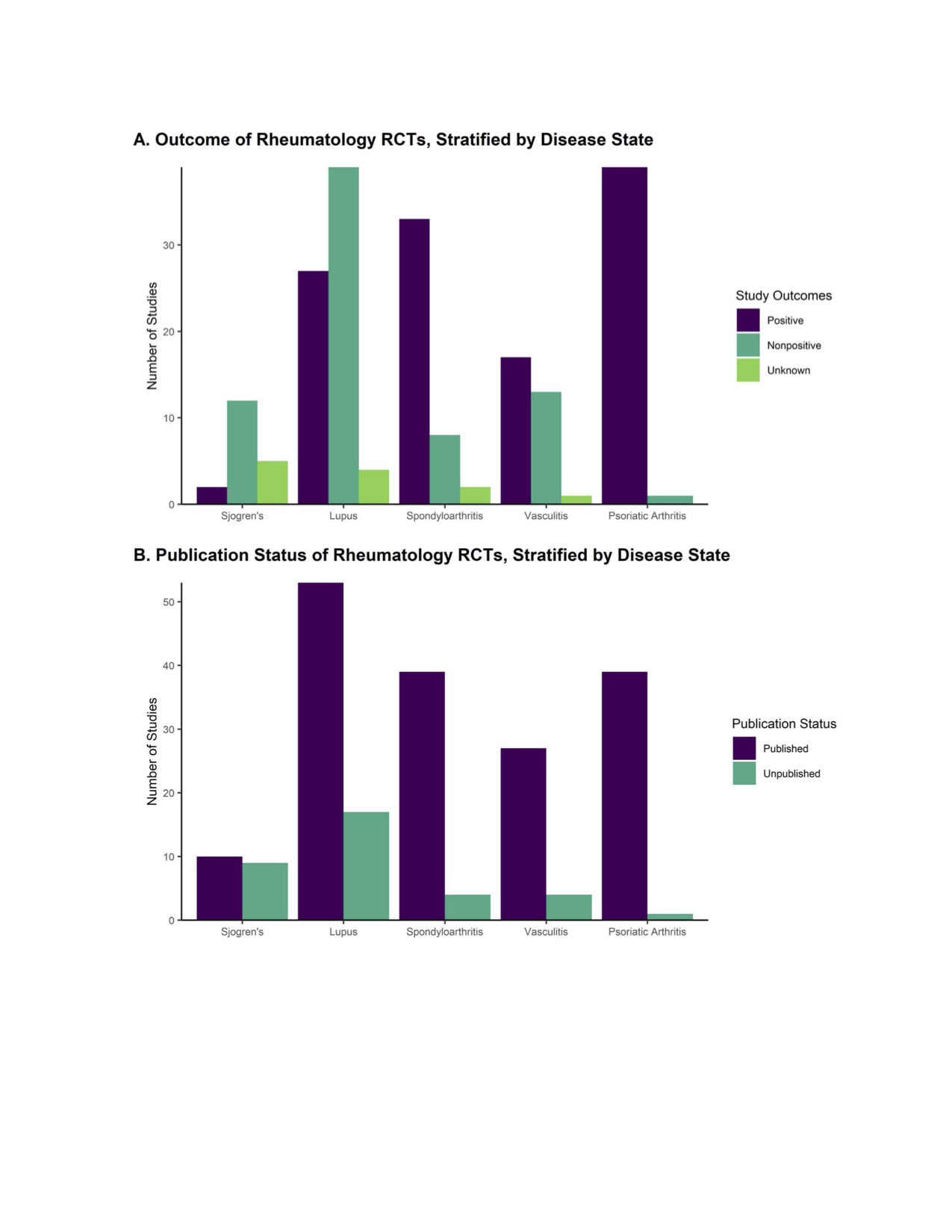Back
Poster Session B
Session: (0807–0832) Miscellaneous Rheumatic and Inflammatory Diseases Poster II
0827: Unpublished Clinical Trials of Major Rheumatic Diseases
Sunday, November 13, 2022
9:00 AM – 10:30 AM Eastern Time
Location: Virtual Poster Hall
- MP
Mike Putman, MD, MSc
The Medical College of Wisconsin
Milwaukee, WI, United States
Abstract Poster Presenter(s)
Connor Pedersen1, Mike Putman2, Erin Valley1, Kathryn Henry3, Ali Duarte-Garcia4, Shikha Singla5 and Shannon Tai1, 1Medical College of Wisconsin, Milwaukee, WI, 2The Medical College of Wisconsin, Milwaukee, WI, 3Medical College of Wisconsin, Manitowoc, WI, 4Mayo Clinic, Rochester, MN, 5MCW, Fox Point, WI
Background/Purpose: Randomized controlled trials (RCTs) provide high-quality evidence for treatment efficacy, but many RCTs remain unpublished. The objective of this study was to describe the proportion of unpublished RCTs in rheumatology and to identify factors associated with publication.
Methods: Registered RCTs for 5 rheumatic diseases (systemic lupus erythematosus, vasculitis, spondyloarthritis, Sjögren's syndrome, and psoriatic arthritis) with over 30 months since study completion were identified using ClinicalTrials.gov. Index publications were identified by NCT ID numbers and structured text searches of publication databases. The results of unpublished studies were identified in abstracts and press releases; reasons for non-publication were assessed by surveying corresponding authors.
Results: Out of 203 studies that met eligibility criteria, 17.2% remained unpublished, representing data from 4,281 trial participants. Higher proportions of published trials were phase 3 RCTs (57.1% vs 28.6% unpublished, p < 0.05) or had a positive primary outcome measure (64.9% vs 25.7% unpublished, p < 0.001), and in a multivariable cox proportional hazards model, a positive outcome was independently associated with publication (HR 1.55, CI 1.09-2.22). Corresponding authors of unpublished trials commonly cited ongoing preparation of the manuscript (50.0%), sponsor/funder issues (40.0%), and unimportant/negative result (20.0%) as reasons for lack of publication.
Conclusion: Nearly one in five RCTs in rheumatology remain unpublished two years after trial completion, and publication is associated with positive primary outcome measures. Efforts to encourage universal publication of rheumatology RCTs and reanalysis of previously unpublished trials should be undertaken.
.jpg) Table 1: Characteristics associated with publication in study RCTs
Table 1: Characteristics associated with publication in study RCTs
 Figure 1 (A): Outcome of Rheumatology RCTs, Stratified by Disease State; Figure 1 (B): Publication Status of Rheumatology RCTs, Stratified by Disease State
Figure 1 (A): Outcome of Rheumatology RCTs, Stratified by Disease State; Figure 1 (B): Publication Status of Rheumatology RCTs, Stratified by Disease State
.jpeg) Figure 2 (A): Time to Publication by Trial Outcome; Figure 2 (B): Time to Publication by Trial Phase
Figure 2 (A): Time to Publication by Trial Outcome; Figure 2 (B): Time to Publication by Trial Phase
Disclosures: C. Pedersen, None; M. Putman, AstraZeneca, AbbVie/Abbott, Novartis; E. Valley, None; K. Henry, None; A. Duarte-Garcia, None; S. Singla, None; S. Tai, None.
Background/Purpose: Randomized controlled trials (RCTs) provide high-quality evidence for treatment efficacy, but many RCTs remain unpublished. The objective of this study was to describe the proportion of unpublished RCTs in rheumatology and to identify factors associated with publication.
Methods: Registered RCTs for 5 rheumatic diseases (systemic lupus erythematosus, vasculitis, spondyloarthritis, Sjögren's syndrome, and psoriatic arthritis) with over 30 months since study completion were identified using ClinicalTrials.gov. Index publications were identified by NCT ID numbers and structured text searches of publication databases. The results of unpublished studies were identified in abstracts and press releases; reasons for non-publication were assessed by surveying corresponding authors.
Results: Out of 203 studies that met eligibility criteria, 17.2% remained unpublished, representing data from 4,281 trial participants. Higher proportions of published trials were phase 3 RCTs (57.1% vs 28.6% unpublished, p < 0.05) or had a positive primary outcome measure (64.9% vs 25.7% unpublished, p < 0.001), and in a multivariable cox proportional hazards model, a positive outcome was independently associated with publication (HR 1.55, CI 1.09-2.22). Corresponding authors of unpublished trials commonly cited ongoing preparation of the manuscript (50.0%), sponsor/funder issues (40.0%), and unimportant/negative result (20.0%) as reasons for lack of publication.
Conclusion: Nearly one in five RCTs in rheumatology remain unpublished two years after trial completion, and publication is associated with positive primary outcome measures. Efforts to encourage universal publication of rheumatology RCTs and reanalysis of previously unpublished trials should be undertaken.
.jpg) Table 1: Characteristics associated with publication in study RCTs
Table 1: Characteristics associated with publication in study RCTs Figure 1 (A): Outcome of Rheumatology RCTs, Stratified by Disease State; Figure 1 (B): Publication Status of Rheumatology RCTs, Stratified by Disease State
Figure 1 (A): Outcome of Rheumatology RCTs, Stratified by Disease State; Figure 1 (B): Publication Status of Rheumatology RCTs, Stratified by Disease State.jpeg) Figure 2 (A): Time to Publication by Trial Outcome; Figure 2 (B): Time to Publication by Trial Phase
Figure 2 (A): Time to Publication by Trial Outcome; Figure 2 (B): Time to Publication by Trial PhaseDisclosures: C. Pedersen, None; M. Putman, AstraZeneca, AbbVie/Abbott, Novartis; E. Valley, None; K. Henry, None; A. Duarte-Garcia, None; S. Singla, None; S. Tai, None.

